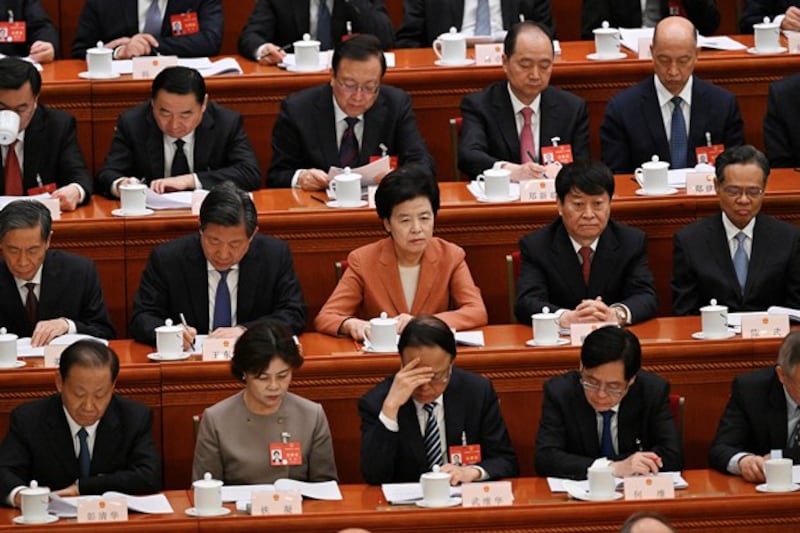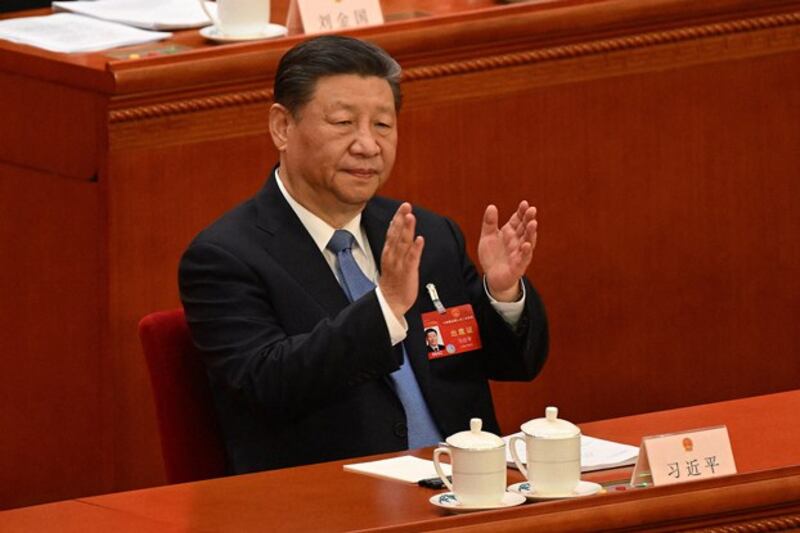Addressing an annual parliamentary session in Beijing, ruling Chinese Communist Party leader Xi Jinping extended "festive" greetings in honor of International Women's Day, which falls Friday, to women delegates to the world's biggest legislature earlier this week.
"I hope that all women will be spirited and energetic, and play their role in advancing China's modernization by holding up half the sky," Xi said, quoting late supreme leader Mao Zedong's epithet about women.
The last time Xi mentioned women specifically in a high-profile speech, he was using similar language to call on them to play an "irreplaceable role" in nurturing "traditional Chinese virtues and fostering stronger family values," according to state media reports of his speech to the All-China Women's Federation in October 2023.
Yet women were only mentioned twice in the annual work report by premier Li Qiang to the assembled National People's Congress, in broad-brushed wording about "protecting their rights and interests." Xi Jinping got 18 mentions in the document, the English version of which ran to nearly 14,000 words.
Women occupy just over 26% of the nearly 3,000 seats in the National People's Congress and slightly more than 22% of seats in its advisory body, the Chinese People's Political Consultative Conference.
That puts China 89th out of 190 in the Parline ranking of female representation in global parliaments. For comparison, the United States ranks 72nd and the United Kingdom 48th.

Further up the echelons of power, a different picture emerges, however.
Just 11 out of 205 members of the Chinese Communist Party's Central Committee are women, while no women have sat on the 24-member Politburo since the retirement of vice premier Sun Chunlan in March 2023. No woman has ever sat on the all-powerful Politburo Standing Committee.
'A male alliance'
While things appear to have worsened under Xi's rule, the "core leadership circle" of the Chinese Communist Party has always excluded women, feminist commentators and rights activists told RFA Mandarin in recent interviews.
"It's a male alliance, and its patriarchal and authoritarian aspects are reflections of each other," U.S.-based feminist activist and writer Lu Pin said.
The few women who do make it to the higher levels of political power aren't representative of Chinese women generally, and don't work to advance their cause, says Lu.
"[They] have no connection with the vast majority of women," Lu said. "Everything they do is just an extension of what their male comrades do."
Women only occupy 8% of jobs in senior leadership positions in China, according to a December 2023 report from the U.S.-China Economic and Security Review Commission.
"All of the national policies affecting China's direction in the 100 years since the Communist Party was founded have been decided by that ... small group of men sitting on the Politburo Standing Committee, which has never had a female member," Zhang Jing, New York-based founder of Women's Rights in China, said in an interview, commenting on that report.
"In particular, the decades of persecution under the one-child policy."
"Marxism does talk about equality between men and women -- at least the concept is there, but Mao Zedong just used that as a slogan without actually putting it into practice," she told Radio Free Asia.

Wang Ruiqin, who once represented the All-China Women's Federation at the Qinghai provincial Chinese People's Political Consultative Conference, agreed.
"The oppression of women ... basically hasn't changed since the founding of the Communist Party 100 years ago -- it's part of traditional culture," she said, commenting on the same report.
"After the Chinese Communist Party took power in 1949 ... they brought in three women as ministers because they had just gotten into power and they needed to put on a show," she said.
"They had slogans about equality between men and women ... but there hasn't been a substantive boost for women's liberation in the more than 70 years since then ... and things have gotten worse under the Xi Jinping administration," Wang said.
The lowest rungs of politics
Sociologist Xu Fang, who lectures at the University of California, Berkeley, said Chinese women have typically shown a better level of participation at lower levels of the political system.
"But as power becomes more and more concentrated, there will be very few women at the tip of the pyramid," she said.
Even on the lowest rungs of politics, participation hasn't even reached the target of one third set during the 1995 World Conference on Women in Beijing, according to veteran feminist activist Feng Yuan, who was present at that event.
"One third is a very important threshold, a kind of critical mass," she said. "The government also made this commitment."
So what kind of progress do Chinese feminists most hope to see over the next few years?
For Lu Pin, civil and political rights are more important than anything else, including economic, social and cultural rights, especially now that the government has suppressed civic groups and non-government organizations that used to promote women's rights.
"Chinese women aren't allowed to fight for their own rights at the moment," she said. "Women should be allowed to decide what rights are important to them, and what methods they want to use to fight for them -- that is the key."
"The reason women's rights have been suppressed is that women haven't been allowed to define what their rights are, then pursue them," she said.
Translated by Luisetta Mudie . Edited by Roseanne Gerin.
